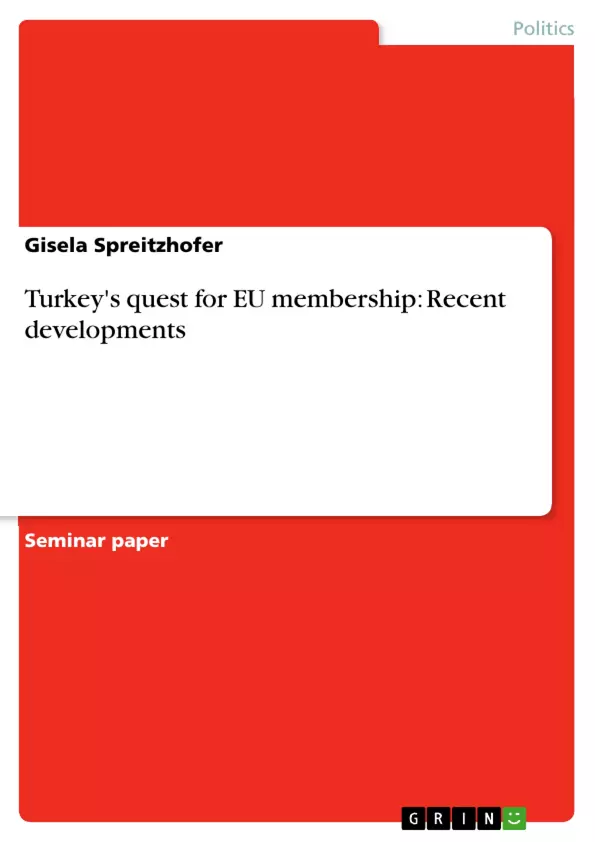Until the formal opening of accession negotiations on 3 October 2005, the long history of EU-Turkey relations seemed to resemble a never-ending story – to the potential benefit of both sides. While Brussels was able to influence Turkish domestic and foreign policy with instruments of conditionality, reform-oriented currents in Ankara gratefully used this external pressure to modernize the country. But at some point, any enlargement process has to set deadlines, enforce conditions, and draw consequences. Therefore, the start of accession talks represented a positive development in so far as it gave a new stimulus to a process that had started slowing down.
However, in November 2006, after Turkey had refused to open its ports and airspace to the Republic of Cyprus, EU-Turkey relations once again deteriorated significantly, leading to Enlargement Commissioner Olli Rehn’s much-quoted statement of a “train crash” scenario. Apart from the Cyprus issue, other developments such as the slowing pace of domestic reforms, the signs of rising of both nationalism and political Islam, and the declining public support for EU membership in Turkey itself (now less than 40%) as well as abroad reconfirm that relations between the two are going through a tumultuous phase – which is unlikely to change for the better soon, given that presidential and parliamentary elections are taking place in Turkey in 2007.
This paper’s goal is to depict and analyze EU-Turkey relations as they have unfolded during the last few years. In order to place recent developments in an accurate historic perspective, I will start by shortly summarizing the relationship from the very beginning until 2005 when official entry talks were finally launched. The next section will be dedicated to an evaluation of what has happened since then – what have been the main events that have put Turkey’s quest for EU membership, whose outcome looked relatively promising in 2005, once again in jeopardy? Then, I will analyze some factors that are perceived as the main obstacles to Turkish accession to the EU. A conclusion will top off the paper.
Inhaltsverzeichnis (Table of Contents)
- INTRODUCTION
- A BRIEF LOOK BACK: EU-TURKEY RELATIONS UNTIL 2005
- DEVELOPMENTS SINCE THE OPENING OF ACCESSION TALKS
- SELECTED OBSTACLES IN THE ACCESSION PROCESS
- CONCLUSION
Zielsetzung und Themenschwerpunkte (Objectives and Key Themes)
This paper aims to analyze and describe EU-Turkey relations in recent years, examining the developments since the opening of accession talks in 2005. It also intends to place these recent events within a historical context by providing a brief overview of the relationship from its beginnings to 2005.
- The historical evolution of EU-Turkey relations
- Developments in the accession process since the opening of talks in 2005
- Challenges and obstacles faced by Turkey in its quest for EU membership
- The impact of domestic and foreign policy factors on EU-Turkey relations
- The role of the Cyprus issue in the accession process
Zusammenfassung der Kapitel (Chapter Summaries)
- Introduction: This section sets the stage for the analysis by outlining the goals of the paper and highlighting the significance of the accession process. It also provides a brief overview of the historical context of EU-Turkey relations, emphasizing the importance of the opening of accession talks in 2005.
- A Brief Look Back: EU-Turkey Relations Until 2005: This chapter delves into the historical background of EU-Turkey relations, tracing the relationship from Turkey's initial application to the EEC in 1959 to the granting of candidate country status in 1999. It examines the factors that influenced the evolving relationship, including Turkey's strategic geopolitical position, its Westernization efforts, and the role of internal transformations within the EU.
- Developments Since the Opening of Accession Talks: This chapter analyzes the progress made in the accession negotiations since their formal launch in 2005. It discusses the screening process, the opening and closing of chapters, and the challenges faced by Turkey in fulfilling the EU's requirements. It also examines the European Commission's annual progress reports and the key concerns they highlight, such as the pace of domestic reforms and the role of the Turkish military.
Schlüsselwörter (Keywords)
The paper focuses on EU-Turkey relations, accession talks, accession process, Turkish reforms, Cyprus issue, political conditionality, economic and political reforms, EU enlargement, and the acquis communautaire.
Frequently Asked Questions
When did Turkey start official EU accession negotiations?
The formal opening of accession negotiations between Turkey and the European Union took place on October 3, 2005.
What is the "Cyprus Issue" in the accession process?
Turkey's refusal to open its ports and airspace to the Republic of Cyprus (an EU member) has been a major obstacle, leading to a significant deterioration in relations.
What are the main obstacles to Turkey's EU membership?
Key obstacles include the slow pace of domestic reforms, human rights concerns, the Cyprus conflict, and declining public support within both Turkey and the EU.
What is "Political Conditionality"?
It refers to the EU's strategy of linking the progress of accession talks to Turkey's success in implementing specific democratic and legal reforms.
What is the "Acquis Communautaire"?
It is the accumulated body of EU law and obligations that every candidate country, including Turkey, must adopt and implement to become a member.
- Quote paper
- MMag. M.A. Gisela Spreitzhofer (Author), 2007, Turkey's quest for EU membership: Recent developments, Munich, GRIN Verlag, https://www.grin.com/document/80231



